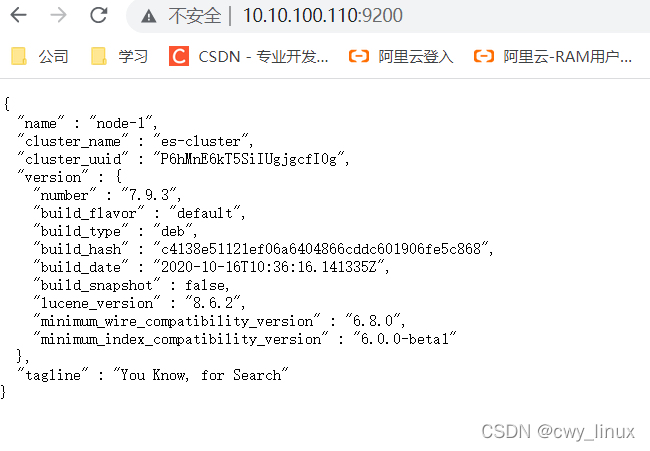热门标签
热门文章
- 1K-Means算法实现鸢尾花数据集聚类_运用python语言编写k-means聚类算法程序,实现对鸢尾花分类。数据可以从python中调
- 2Spine在Unity中常见问题_spine 高版本导出无法导入低版本
- 3Tensorflow(三)训练自己的数据,分块版本_train_logits = model.inference(train_batch, batch_
- 42020年最新 C# .net 面试题,月薪20K+中高级/架构师必看(一)_net 6 cross cutting
- 5Unity 2D人物运动不协调的检查方法(本人专用)
- 6Unity IL2CPP发布64位,以及代码裁剪Strip Engine Code_unity link.xml
- 723个机器学习最佳入门项目(附源代码)_python机器学习项目
- 8史上最全阿里技术面试题目_阿里巴巴技术面试的题目
- 9基于LSTM的股票价格预测_lstm预测股票
- 10git的基本使用_git checkout --track
当前位置: article > 正文
elasticsearch 集群部署_elasticsearch集群如何部署
作者:我家自动化 | 2024-02-21 21:15:24
赞
踩
elasticsearch集群如何部署
1、环境初始化
最小化安装 Centos 7.x/Ubuntu x86_64 操作系统的虚拟机,vcpu 2,内存 4G 或更多,操作系统盘 50G,为保证效果特额外添加一块单独的数据磁盘大小为 50G 并格式化挂载到/data
1.1 设置主机名和磁盘挂载
节点信息
IP
主机名
角色
系统版本
10.10.100.110
es-node1
node1
Ubuntu 18.04.3
10.10.100.111
es-node2
node2
Ubuntu 18.04.3
10.10.100.112
es-node3
node3
Ubuntu 18.04.3
#修改三个节点的主机名
root@ubuntu-node1:~# hostnamectl set-hostname es-node1
root@ubuntu-node1:~# hostnamectl set-hostname es-node2
root@ubuntu-node1:~# hostnamectl set-hostname es-node3
#分区
root@es-node1:~# lsblk -l
NAME MAJ:MIN RM SIZE RO TYPE MOUNTPOINT
sda 8:0 0 100G 0 disk
sda1 8:1 0 100G 0 part /
sdb 8:16 0 50G 0 disk
sr0 11:0 1 1024M 0 rom
root@es-node1:~# fdisk /dev/sdb
Command (m for help): n
Partition type
p primary (0 primary, 0 extended, 4 free)
e extended (container for logical partitions)
Select (default p): p
Partition number (1-4, default 1):
First sector (2048-104857599, default 2048):
Last sector, +sectors or +size{K,M,G,T,P} (2048-104857599, default 104857599):
Created a new partition 1 of type 'Linux' and of size 50 GiB.
Command (m for help): w
root@es-node1:~# mkdir /esdata
root@es-node1:~# mkfs.xfs /dev/sdb1
meta-data=/dev/sdb1 isize=512 agcount=4, agsize=3276736 blks
= sectsz=512 attr=2, projid32bit=1
= crc=1 finobt=1, sparse=0, rmapbt=0, reflink=0
data = bsize=4096 blocks=13106944, imaxpct=25
= sunit=0 swidth=0 blks
naming =version 2 bsize=4096 ascii-ci=0 ftype=1
log =internal log bsize=4096 blocks=6399, version=2
= sectsz=512 sunit=0 blks, lazy-count=1
realtime =none extsz=4096 blocks=0, rtextents=0
root@es-node1:~# mount /dev/sdb1 /esdata
root@es-node1:~# vim /etc/fstab
/dev/sdb1 /esdata xfs defaults 0 0
- 1
- 2
- 3
- 4
- 5
- 6
- 7
- 8
- 9
- 10
- 11
- 12
- 13
- 14
- 15
- 16
- 17
- 18
- 19
- 20
- 21
- 22
- 23
- 24
- 25
- 26
- 27
- 28
- 29
- 30
- 31
- 32
- 33
- 34
- 35
- 36
- 37
- 38
- 39
- 40
2、安装elasticsearch集群
https://github.com/elastic #github 地址
2.1 jdk安装
elasticsearch 服务运行需要 java 环境
root@es-node1:~# tar xf jdk-8u301-linux-x64.tar.gz -C /usr/local/
root@es-node1:~# ln -sv /usr/local/jdk1.8.0_301 /usr/local/jdk
root@es-node1:~# ln -sv /usr/local/jdk/bin/java /usr/bin/
root@es-node1:~# vim /etc/profile
export JAVA_HOME=/usr/local/jdk
export CLASSPATH=.:$JAVA_HOME/jre/lib/rt.jar:$JAVA_HOME/lib/dt.jar:$JAVA_HOME/lib/tools.jar
export PATH=$PATH:$JAVA_HOME/bin
root@es-node2:~# source /etc/profile
root@es-node1:~# java -version
java version "1.8.0_301"
Java(TM) SE Runtime Environment (build 1.8.0_301-b09)
Java HotSpot(TM) 64-Bit Server VM (build 25.301-b09, mixed mode)
- 1
- 2
- 3
- 4
- 5
- 6
- 7
- 8
- 9
- 10
- 11
- 12
2.2 下载 elasticsearch 并安装
下载地址:https://www.elastic.co/downloads/elasticsearch
#下载安装包
root@es-node1:~# wget https://artifacts.elastic.co/downloads/elasticsearch/elasticsearch-7.9.3-amd64.deb
#安装
root@es-node1:~# dpkg -i elasticsearch-7.9.3-amd64.deb
#配置文件
root@es-node1:~# grep "^[^#]" /etc/elasticsearch/elasticsearch.yml
#ELK 的集群名称,名称相同即属于是同一个集群
cluster.name: es-cluster
#当前节点在集群内的节点名称
node.name: node-1
#ES 数据保存目录
path.data: /esdata/elasticsearch
#ES 日志保存目
path.logs: /esdata/log/elasticsearch
#服务启动的时候锁定足够的内存,防止数据写入swap
bootstrap.memory_lock: true
#监听 IP
network.host: 0.0.0.0
#监听端口
http.port: 9200
#集群中 node 节点发现列表
discovery.seed_hosts: ["10.10.100.110", "10.10.100.111","10.10.100.112"]
#集群初始化那些节点可以被选举为 master
cluster.initial_master_nodes: ["10.10.100.110", "10.10.100.111","10.10.100.112"]
#一个集群中的 N 个节点启动后,才允许进行数据恢复处理,默认是 1
gateway.recover_after_nodes: 2
# 设置是否可以通过正则或者_all 删除或者关闭索引库,默认 true 表示必须需要显式指定索引库名称,生产环境建议设置为 true,删除索引库的时候必须指定,否则可能会误删索引库中的索引库。
action.destructive_requires_name: true
#拷贝配置文件到其他节点,并修改节点名称 node.name:
root@es-node1:~# scp /etc/elasticsearch/elasticsearch.yml 10.10.100.111:/etc/elasticsearch/
root@es-node1:~# scp /etc/elasticsearch/elasticsearch.yml 10.10.100.112:/etc/elasticsearch/
- 1
- 2
- 3
- 4
- 5
- 6
- 7
- 8
- 9
- 10
- 11
- 12
- 13
- 14
- 15
- 16
- 17
- 18
- 19
- 20
- 21
- 22
- 23
- 24
- 25
- 26
- 27
- 28
- 29
- 30
- 31
- 32
- 33
2.3 修改内存限制
root@es-node1:~# vim /usr/lib/systemd/system/elasticsearch.service
LimitMEMLOCK=infinity #无限制使用内存
root@es-node1:~# vim /etc/elasticsearch/jvm.options
-Xms2g
-Xmx2g #最小和最大内存限制
#官方配置文档最大建议 30G 以内
https://www.elastic.co/guide/en/elasticsearch/reference/current/heap-size.html
- 1
- 2
- 3
- 4
- 5
- 6
- 7
2.4 目录权限修改
root@es-node1:~# chown elasticsearch.elasticsearch /esdata/ -R
- 1
2.5 启动elasticsearch 并验证
#所有节点启动
root@es-node1:~# systemctl start elasticsearch
root@es-node1:~# systemctl enable elasticsearch
root@es-node2:~# systemctl start elasticsearch
root@es-node2:~# systemctl enable elasticsearch
root@es-node3:~# systemctl start elasticsearch
root@es-node3:~# systemctl enable elasticsearch
- 1
- 2
- 3
- 4
- 5
- 6
- 7
查看监听端口

浏览器访问查看

2.6 安装 elasticsearch 插件 head
2.6.1 amp安装head
root@es-node1:~# apt install -y npm
root@es-node1:~# cd /usr/local/src/
root@es-node1:/usr/local/src# git clone https://github.com/mobz/elasticsearch-head.git
root@es-node1:/usr/local/src# ls
elasticsearch-head
root@es-node1:/usr/local/src# cd elasticsearch-head/
#配置阿里npm镜像
root@es-node1:/usr/local/src/elasticsearch-head# npm --registry https://registry.npm.taobao.org install express
root@es-node1:/usr/local/src/elasticsearch-head# npm config set registry https://registry.npm.taobao.org
root@es-node1:/usr/local/src/elasticsearch-head# npm install grunt -save
#后台运行
root@es-node1:/usr/local/src/elasticsearch-head# npm run start &
- 1
- 2
- 3
- 4
- 5
- 6
- 7
- 8
- 9
- 10
- 11
- 12
2.6.2 通过docker安装head
# step 1: 安装必要的一些系统工具
sudo apt-get update
sudo apt-get -y install apt-transport-https ca-certificates curl software-properties-common
# step 2: 安装GPG证书
curl -fsSL https://mirrors.aliyun.com/docker-ce/linux/ubuntu/gpg | sudo apt-key add -
# Step 3: 写入软件源信息
sudo add-apt-repository "deb [arch=amd64] https://mirrors.aliyun.com/docker-ce/linux/ubuntu $(lsb_release -cs) stable"
# Step 4: 更新并安装Docker-CE
sudo apt-get -y update
sudo apt-get -y install docker-ce
#启动docker
root@es-node2:~# systemctl start docker
root@es-node2:~# systemctl enable docker
#通过docker启动head
root@es-node2:~# docker run -d -p 9100:9100 mobz/elasticsearch-head:5
- 1
- 2
- 3
- 4
- 5
- 6
- 7
- 8
- 9
- 10
- 11
- 12
- 13
- 14
- 15
- 16
- 17
2.7 修改 elasticsearch 服务配置文件
开启跨域访问支持,然后重启 elasticsearch 服务
root@es-node1:~# vim /etc/elasticsearch/elasticsearch.yml
#开启支持跨域访问
http.cors.enabled: true
#指定允许访问范围
http.cors.allow-origin: "*"
#重启
root@es-node1:~# systemctl restart elasticsearch
- 1
- 2
- 3
- 4
- 5
- 6
- 7
- 8
2.8 浏览器访问测试
head访问地址 ip:9100


声明:本文内容由网友自发贡献,不代表【wpsshop博客】立场,版权归原作者所有,本站不承担相应法律责任。如您发现有侵权的内容,请联系我们。转载请注明出处:https://www.wpsshop.cn/w/我家自动化/article/detail/126614
推荐阅读
相关标签


